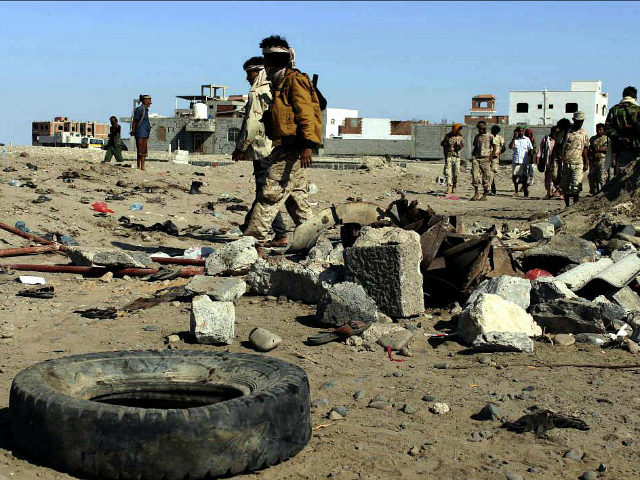UNITED NATIONS – As a years-long civil war and a growing cholera epidemic wreak havoc in Yemen, United Nations officials expressed frustration and rang alarm bells Wednesday but offered little hope of a solution.
Special Envoy to Yemen Ismail Ould Cheikh Ahmed, whom many have criticized for his job performance, painted yet another grim description of the state of affairs in the country at a Security Council meeting called to discuss the crisis on Wednesday:
The humanitarian situation in Yemen is appalling. The people are suffering from war, hunger and cholera, which has spread further during the last few weeks. The country is not suffering from a single emergency but a number of complex emergencies, which have affected more than 20 million people and whose scale and effect will be felt long after the end of the war. 14 million people are food insecure, of whom almost 7 million are at risk of famine.
He said that despite calls for warring parties to respect international humanitarian laws, the civilian death count was still rising. He added that movements by terrorist groups, including Al-Qaeda in the Arab Peninsula (AQAP), undermine moves to bring peace to the region.
“The longer the conflict lasts, the more the terrorist groups expand and will threaten Yemen’s future,” he said. In 2014, Iran-backed Houthi rebels swept the government out of power, which was met by airstrikes in 2015 by Saudi-backed forces supporting the U.N.-approved government. On Wednesday, Ahmed offered a stern warning to warring factions.
“History will not judge kindly those Yemeni leaders who have used the war to increase their influence or profit from the public finances and Yemeni patience will not last,” he said.
The situation has been exacerbated by an outbreak of cholera that has spread aggressively in recent weeks. Official figures put the number of suspected cases of cholera at just over 300,000, and more than 1,700 have died as a result of the epidemic, made worse as many healthcare workers have not been paid for months, and healthcare facilities have closed.
On Tuesday, the U.N. announced in Geneva that it was suspending plans for a cholera vaccination campaign as the disease’s spread, as well as the civil war, made such an effort ineffective. It marks the latest defeat for a body which has been unable to make a significant dent in the crisis for years.
The U.N., and Ahmed, in particular, have come under fire for the failing efforts in the country. The Iran-backed Houthi rebels have refused to deal with the U.N. until Ahmed is removed, with a top official telling Breitbart News that he is “incompetent and corrupt” and was not allowed into Houthi-controlled territory.
However, Ahmed says that he has been in “direct contact with” the Houthis in recent days, which he said is a cause for optimism.
A Saudi government official told Breitbart News last week that the Saudis were also unhappy with the way the U.N. has handled the crisis. Sources told Breitbart that Under-Secretary-General for Political Affairs Jeffrey Feltman was denied entry to Saudi Arabia as part of his trip to the Persian Gulf to help solve the blockade of Qatar, in part because of Saudi anger at the U.N.’s fumblings in Yemen.
Ahmed was rumored to be on his way out of the post, to be moved to the position of special envoy to Libya. However, another diplomat filled that post, and on Wednesday, Chinese Ambassador and Security Council President Liu Jieyi said the Security Council reiterated its support for Ahmed. He also said the Council agreed that a political solution was the only way the civil war and the humanitarian crisis could come to an end.
However, among the many statements made in New York Wednesday, few solutions seemed to be on hand beyond those that could ease suffering but not end it. Ahmed called for the reopening of the airport in Sanaa to commercial flights and also noted an upcoming World Bank-sponsored cash transfer program that he said would help the poorest families. There are also efforts underway to clear the vital Hodeidah port to humanitarian aid and commerce as a way to bring much-needed aid and revenue into the area.
Under-Secretary-General for Humanitarian Affairs Stephen O’Brien also called for top countries and donors to give more to the relief effort:
Fresh funds are needed to scale up further, pledges made in Geneva at the April conference must be turned into cash, and the UN and its partners must be allowed to use funds flexibly to tackle the multitude of crises this conflict has created. The cholera response now requires an additional $250 million, of which $47 million has been received.
He also told the Council, “There’s been no change, only for the worse” in recent months. Additionally, both Ahmed and O’Brien called for public sector – including healthcare – workers to be paid. Like Ahmed, O’Brien also took aim at the warring factions in Yemen:
At what point will the parties shoulder their responsibilities to protect civilians and civilian infrastructure – hospitals, medical facilities and schools and to provide basic services for the population? At what point will those supporting the parties in the conflict take necessary action? This cholera scandal is entirely manmade by the conflicting parties and those beyond Yemen’s borders who are leading, supplying, fighting and perpetuating the fear and fighting.
In that statement, the U.N. seemed to be acknowledging a bleak reality: it can only work to resolve the crisis if the respective sides are willing to end the conflict, and judging from the mood at the U.N., there seem to be few signs of that transpiring.
Adam Shaw is a Breitbart News politics reporter based in New York. Follow Adam on Twitter: @AdamShawNY.

COMMENTS
Please let us know if you're having issues with commenting.